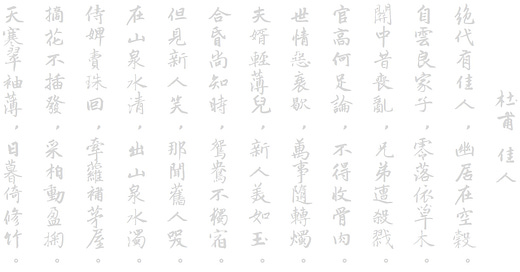The Fine Lady Du Fu There was a lady in the hills So beautiful that she outshone All others in the world, but she Lived in this wild obscurity. She said she was the daughter of Distinguished family, but now Had fallen on hard times. Just trees And herbs provided for her needs. “When war engulfed the heartlands, all My brothers brutally were killed. What use high office if their bones Could not be found and brought back home? “In this world weakness and decline Win nothing but contempt. Those things You thought were constant always change Just like a wind-blown candle flame. “My husband soon abandoned me, Discarded me like something cheap. He found himself a newer bride, A beauty blessed with skin like jade. “Mimosa leaves clasp tight at dusk, And faithful ducks don’t sleep alone. He saw the smile on his new bride, But he was deaf when the old one cried. “The water from a mountain spring Is clear while it is in the hills. But when the water trickles down Beyond the hills, it’s muddy brown.” Her servant soon returned; she’d sold A few more of the lady’s jewels. They tugged on vines to try and patch The old and damaged cottage thatch. The flowers they picked were not for her To decorate her lovely hair. They took fistfuls of bitter seeds From funereal cypress trees. The wind was cold, her mint-green sleeves Were too thin in the setting sun. I saw her lean as darkness grew Against the elegant bamboo.
It might seem natural to illustrate a poem about a beautiful woman with a picture of a beautiful woman. But Du Fu’s poem is sufficiently complex that it’s hard to imagine an image that does it justice. He names her a fine lady, with implications of beauty, wealth, and poise, but undercuts that title by placing her in desperate, if genteel, poverty. And her fineness also springs from her goodness. She makes the highly moral choice to withdraw from society after being abandoned by her husband, and explains it with a crunchingly literal metaphor: water near its mountain spring source is pure; water that has flowed around the block a few times is dirty; so to maintain her purity, she physically locates herself in the hills.
And yet, and yet… undercutting all of this is the long tradition of sexual encounters with nymphs in the wild. Canonically, the first was a King of Chu, who met the goddess Yaoji on Mount Wu. In this poem, the lady is in need of a man; talks frankly about sex with the visitor; and is seen in thin clothing just as the sun sets. It’s hard not to see the erotic potential.
But Du Fu is not usually interested in the erotic - his sexiest poem is about his wife. And the primary meaning of this poem is clearly to highlight the pity of war, which Du recognises as displacing everyone, not just the soldiers directly involved. So I think the best reading is to see the sexual tension as highly subtextual, simply adding another layer of weirdness and richness to this soulful ballad.
杜甫 佳人
绝代有佳人,幽居在空谷。
自云良家子,零落依草木。
关中昔丧乱,兄弟遭杀戮。
官高何足论,不得收骨肉。
世情恶衰歇,万事随转烛。
夫婿轻薄儿,新人美如玉。
合昏尚知时,鸳鸯不独宿。
但见新人笑,那闻旧人哭。
在山泉水清,出山泉水浊。
侍婢卖珠回,牵萝补茅屋。
摘花不插发,采柏动盈掬。
天寒翠袖薄,日暮倚修竹。



